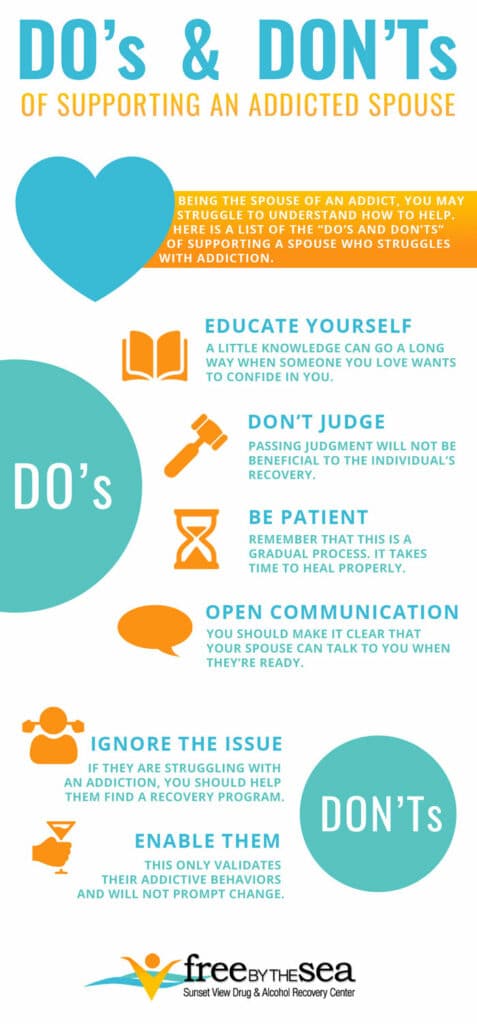A Guide for Spouses of Addicts: How to Help Your Loved One
Addiction to drugs and alcohol is an issue that no one should have to go through alone. If you’re the spouse of an addict, it is important to learn how to properly assist them as they recover. Support is extremely important for those struggling with drug or alcohol addiction.
If you are not sure how to support your spouse or provide the help they need, keep reading to understand the best ways you can help ensure their success. You can also learn about how addiction can affect you and your loved one, and how you can deal with your issues surrounding addiction.
The Importance of Support

It is difficult for someone to go through the process of rehabilitation when they are lacking a support system. Human beings are social creatures and, although we might not always like it, we need each other. Without conscious effort from loved ones, the recovery process can be lonely.
A strong support system can strengthen the chance of successful long-term recovery. When an addict loses motivation to continue with their treatment program, strong support from loved ones could be the difference between success and failure.
Reasons To Continue Supporting Them
These are just a few of the reasons why it is important to continuously support your spouse. They are going to need someone to help them through the struggles they will encounter in the recovery process.
- Facing challenges isn’t as difficult with support. Having someone to rely on when temptations or obstacles arise makes those emotions seem manageable.
- You can hold them responsible for their actions. Sometimes, addicts become too confident in recovery or fall back in old behavior patterns. A loved one provides valuable insight into their behavior. This accountability can help them address the issues.
- Their confidence and self-esteem grow when they have the support they need. It feels good to have people who want to be around you and who care for your success. It is the same with overcoming addiction; a cheering section in their favor will help them have a more positive outlook on the future.
Dos and Don’ts of Supporting Your Loved One
Being the spouse of an addict, you might struggle to understand how to best support them. Here is a list of the “do’s and don’ts” you may need to consider. These tips will help you encourage your spouse throughout the entire recovery process.

Dos
Educating yourself is a good first step in learning how to support your spouse or loved one. An easy way to get started is to do some research on your own about the recovery process. A little knowledge can go a long way when someone you love is struggling and wants to confide in you. Visit our resource page to learn knowledge that could be useful.
Open communication is necessary in order to maintain a connection with one another. You should make it clear that your spouse can talk to you when they’re ready. Do not, however, pressure anyone into talking about their painful experiences if they are not comfortable doing so. Open communication will make it possible for you to better understand what the individual is feeling.
Avoid placing blame on anyone for what is happening. Passing judgment will not be beneficial to the individual’s recovery. They are trying to heal from their past mistakes, so shaming them for said mistakes could be detrimental to their recovery. You should also avoid placing blame or guilt on yourself. Addiction can affect anyone, so it’s best to focus on recovery rather than who’s to blame.
Be patient with your spouse during this period of recovery. Remember that this is a gradual process. It takes time to heal properly for both the spouse of the addict and the addict. It takes time for them to fully realize what repercussions their actions have caused in their life and in their loved one’s life.
Don’ts
Ignoring the issue will only cause more issues. No matter what the cause is, don’t try to pretend that your spouse’s addiction is not a problem. Think of it as though it were a physical health issue; you would make them see a doctor. If they are struggling with addiction, you should help them find a recovery program.
Enabling your spouse means encouraging negative behaviors. Enabling is not the same thing as supporting. Some examples of ways a spouse of an addict might be enabling them includes lying for your spouse or helping them “cover up” their addiction. This only validates their addictive behaviors and will not prompt change.
Expect things to go back to normal? Think again. Once your spouse is actively working to remain sober, your life and marriage will never be the same as it was before. There will be a new normal, which is a good thing. No matter how “good” things seemed to be with your spouse, it was tainted by the presence of addiction. Instead of hoping to return to normal, allow this change to strengthen your relationship.
Effects Of Substance Abuse On A Marriage
Addiction can take a serious toll on personal relationships and particularly on marriages. One of the biggest problems caused by substance abuse is a financial strain. Addiction can be very costly and have a negative impact on family finances.
Substance abuse can lead to arguments and fights, which could in turn lead to more substance abuse. There are a number of things that could be argued about when you are married to an addict. Arguments can occur about their drug or alcohol use, staying out late, or neglecting home responsibilities.
If you have been unaware or lied to about your spouse’s use of drugs and alcohol, your trust for them could be negatively affected.
Trust is the most important part of a marriage and substance abuse could erode the trust that forms the foundation of your relationship. Lies about where the addicted spouse is or what they’re doing could continue throughout early recovery. Trust issues may persist throughout this time and both parties will need to work on this area.
We have covered many issues that can arise in marriages with an addict. Neglecting to communicate with one another could lead to these and many more issues. Although issues will seem to be overwhelming, remember that you and your spouse are partners and try to use these struggles to bring you closer.
How Addiction Impacts the Spouse of an Addict
Once it has become clear that you are the spouse of an addict, it is normal to feel lost and overwhelmed. If you are the spouse of an addict, it is likely that you have been hurt by their past actions. It is acceptable to bring up this hurt in the right setting, as long as you do it in a way that doesn’t blame the struggling individual for your troubles.
Intimate relationships should feel safe and comfortable for each person. When you’re married to an addict, this is not always the case. Fortunately, there are plenty of things you can do to cope with the new reality in which you live.
How Can Treatment Help The Spouse Of An Addict?

There are many treatment options available that can be effective in eliminating problems in relationships when you are married to an addict. There are treatments for individuals that will include the partner in some way.
Involving partners in the addiction rehab process at some point is likely to help the treatment succeed. It is important to address and treat any problems in the relationship. After all, these problems will not disappear when the drinking or drug use ends.
Some couples become discouraged when they continue to have fights and arguments after the substance abuse has stopped. Recovery involves treating internal problems of the addict and also resolving problems that occur as a side effect of the addiction.
If the issues in the relationship are not treated, they can set the tone for continued conflict. This would, in turn, possibly cause relapse to alcohol or drug use. This is why it is so important to get help resolving the problems between the two of you.
Eliminating drug or alcohol abuse is the starting point in recovery, often beginning with a medical detox for alcohol. Reconciling with loved ones plays a key role in supporting lasting sobriety.
Contact Free by the Sea Today
If your spouse is experiencing addiction to drugs or alcohol, you could be the one to help them take the first step. They will need the support that you can provide in order to overcome their addiction.
Don’t let them do it alone. The success of their recovery not only affects them but also you. Getting professional help could help their well being along with yours and there is no reason not to get the help needed.
Now is the time to encourage your spouse to seek out help. Support them and share with them your concerns for their future. As the two of you learn more about addiction and its effects on your lives and marriage, healing will begin.
At Free by the Sea, we offer a variety of addiction treatments for drug and alcohol abuse. Please contact us to discuss how we can help you and your spouse today.

Dr. Richard Crabbe joined our team in 2019 as our psychiatrist and medical director. He attended the University of Ghana Medical School where he became a Medical Doctor in 1977. From 1978 through 1984, he was a medical officer in the Ghana Navy and provided a variety of services from general medicine to surgeries. He received his Certificate in General Psychology from the American Board of Psychology and Neurology in 2002.
Insurances We Accept
Free by the Sea recognizes the importance of having insurance to receive addiction treatment. Let us work with you to provide you or a loved one with premier addiction treatment services. We accept several private insurance plans. Verify your rehab coverage with us today to ensure you receive the support that you need! Find out if you are covered today!











